Author ORCID Identifier
https://orcid.org/0000-0002-5330-6500
Abstract
This case study examines the impacts of a project that utilised a form of collaborative innovation, called co-creation, to embed sustainability into the five-year Bachelor of Architecture programme curriculum at the Technological University Dublin. This project’s co-creation process deployed design thinking, a term used to describe a human-centred creative problem solving process, to develop understanding, create shared purpose, and generate accountability across a wide range of the academic programme stakeholders to enact change. The project’s approach sponsored an opportunity for exchange and dialogue which enabled cultural change, using the unique and established pedagogy found within the programme’s core learning subject, Architectural Design Studio. The project prompted a philosophical movement away from traditional linear programme development and provided an interconnected, transparent, circular pattern of interactions (referred to as feedback loops) enabling students and educators to engage directly with the complex challenge of addressing Climate Change[1] in architectural education. This paper explores the innovation opportunities possible when addressing sustainability challenges through the integration of co-creation, curriculum development, and design thinking.
[1] Climate Change as defined by the Intergovernmental Panel on Climate Change. (2018) Special Report: Global Warming of 1.5° C: (Summary for Policymakers) https://www.ipcc.ch/sr15/chapter/spm/
Creative Commons License

This work is licensed under a Creative Commons Attribution 4.0 International License.
Recommended Citation
Boyer, Jennifer E.
(2022)
"Design for Climate - A Case Study from Architectural Education,"
Irish Journal of Academic Practice:
Vol. 10:
Iss.
1, Article 2.
doi:https://doi.org/10.21427/hdvq-k724
Available at:
https://arrow.tudublin.ie/ijap/vol10/iss1/2
DOI
https://doi.org/10.21427/hdvq-k724

